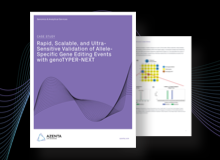High-Throughput Genotyping (CRISPR Validation)
High-throughput genotyping is a next generation sequencing (NGS)-based assay ideal for ultra-sensitive, high-throughput, sample-to-answer genotyping projects, particularly to validate targeted CRISPR gene editing experiments. Advancements in genome editing techniques, namely CRISPR/Cas9, have greatly facilitated cell line engineering, gene targeting, and the development of transgenic models. However, accurately identifying correctly targeted cells remains a significant bottleneck for large-scale projects.
Our proprietary, high-throughput genotyping service, genoTYPER-NEXT™, is a more effective and efficient approach than T7E1, TIDE, and IDAA assays for screening targeted cell lines. We also offer targeted, whole genome, and amplicon NGS solutions to aid on- and off-target analysis of genome editing.
What is high-throughput genotyping?
High-throughput genotyping is the rapid analysis of genetic markers or gene variations in a sample, often with tens to hundreds of samples simultaneously. This method is a valuable tool for researchers conducting genome-wide association studies (GWAS), population genetics studies, pharmacogenomics, and research involving genetic risk factors and responses to drug therapies.
How do you validate CRISPR gene editing?
CRISPR gene editing is validated by polymerase chain reaction (PCR), Sanger sequencing, or NGS. These techniques are used to identify and verify gene modifications within the edited DNA sample.
What is the target validation of CRISPR-Cas9?
The target validation of CRISPR-Cas9 is the confirmation of selected guide RNA (gRNA) sequences and its specificity to the gene of interest. This method involves analyzing other genomic loci that share sequence similarity with the chosen gRNA and comparing it to the non-targeted controls (gRNA targeting a non-functional region) to ensure that the gRNA predominantly targets the intended genomic locus. The functional consequences of gene editing,such gene knockout and subsequent absence of protein expression, are confirmed and quantified via quantitative PCR (qPCR) or deep sequencing.
genoTYPER-NEXT: HIGH-THROUGHPUT ASSAY FOR CRISPR VALIDATION
1. SUBMIT SAMPLES
Submit CRISPR-edited cell lines in 96-well plates
2. AMPLIFY ON/OFF-TARGET SITE(S)
Cells lysis and PCR with barcoded primers
3. SEQUENCE
Samples pooled and sequenced on Illumina® platform
4. ANALYZE DATA INTERACTIVELY
Visualize results in genoTYPER-NEXT browser
View our other NGS services for CRISPR Validation
FEATURES & BENEFITS

Case Study | Rapid, Scalable, and Ultra-Sensitive Validation of Allele-Specific Gene Editing Events with genoTYPER-NEXT™
Discover the powerful capabilities of genoTYPER-NEXT in this illuminating case study and learn how this high-throughput assay allows rapid and accurate genotyping of CRISPR-edited cell lines.


Blog | NGS, PCR, or Sanger Sequencing: An Assay Selection Guide
This selection guide offers practical information about PCR + Sanger, qPCR, and NGS approaches to help you determine which assay best suits your project requirements, along with an interactive assay selection tool to aid your decision making.
NGS PLATFORMS
For information on our NGS platforms as well as recommended configurations of your projects, please visit the NGS Platforms page. GENEWIZ from Azenta does not guarantee data output or quality for sequencing-only projects.









